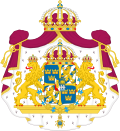Monarchy of Sweden
The monarchy of Sweden is the monarchical head of state of Sweden.[3] Sweden is a constitutional and hereditary monarchy with a parliamentary system.[4] Sweden was originally an elective monarchy, it became an hereditary monarchy in the 16th century during the rule of Gustav Vasa.[5]
| King of Sweden | |
|---|---|
| Sveriges Konung | |
 | |
| Incumbent | |
 | |
| Carl XVI Gustaf since 15 September 1973 | |
| Details | |
| Style | His Majesty |
| Heir apparent | Victoria |
| First monarch | Eric the Victorious |
| Formation | 970 |
| Residence | Stockholm Palace[1] Drottningholm Palace[2] |
| Website | www |
Monarchy Of Sweden Media
kunuki, i.e. konungi, the dative case for Old Norse konungr ("king"). A runic inscription of the 11th century (U11) refers to King Håkan the Red.
Gustav I, portrayed here in 1542 by Jakob Binck, legally created the hereditary monarchy and organized the Swedish unitary state.
References
- ↑ "The Royal Palace of Stockholm". Royal Court of Sweden. Archived from the original on 8 February 2014. Retrieved 23 February 2014.
- ↑ "Drottningholm Palace". Royal Court of Sweden. Archived from the original on 8 February 2014. Retrieved 23 February 2014.
- ↑ See the Instrument of Government, Chapter 1, Article 5.
- ↑ Parliamentary system: see the Instrument of Government, Chapter 1, Article 1.
- ↑ "The Monarchy in Sweden". Royal Court of Sweden. Archived from the original on 2018-03-22. Retrieved 2014-02-22.








